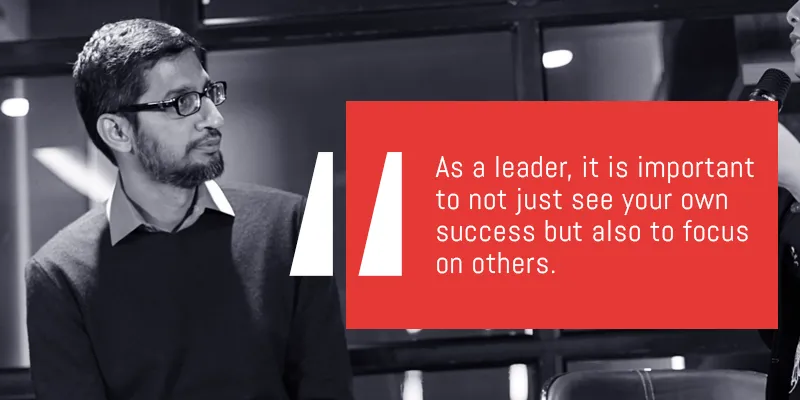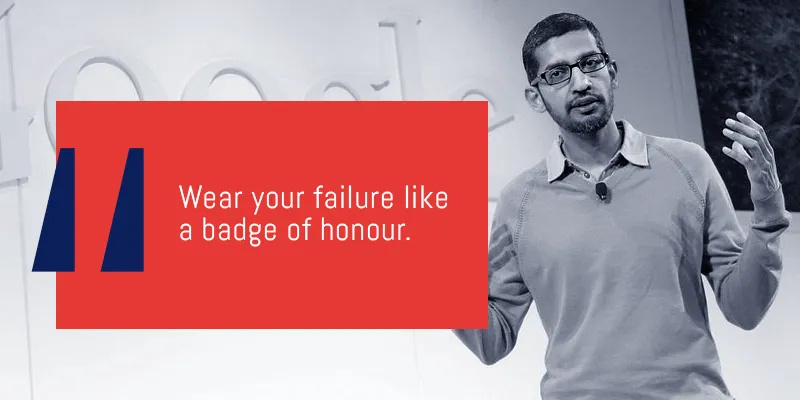Google's captain Sundar Pichai bats for wearing failure as a badge of honour
From a shy-yet-brilliant Chennai boy to leading one of the biggest tech giants in the world, it’s been quite a life for Sundar Pichai. A genius in his own right from his early days, Sundar’s interaction with his father, who also happened to be an electrical engineer, nurtured and bolstered his interest in the field of technology. This curiosity is what led him to coveted institutions like IIT Kharagpur, Stanford, and Wharton. But his true successes have been in overcoming cultural differences and standing out through sheer hard work.

Silicon Valley has traditionally had a cookie-cutter stereotype for its CEOs – outgoing, extroverted, often autocratic, sometimes even brash. But as technology gets increasingly consumer-centric and human, there has been a whole new wave of leadership in the Valley, one that chooses Dara Khosrowshahi of Uber over Travis Kalanick, Satya Nadella of Microsoft over Steve Ballmer, and so on. It is starting to look like it’s finally time for compassionate yet result-driven, intelligent yet humble leaders to have their time in the sun. Sundar is making the most of this change in his role as the CEO of Alphabet Inc and Google.
Since he took on the role of Google CEO, he has been part of many interviews and keynotes. We compiled his quotes and lessons here as a ready reckoner the next time you are looking for some inspiration to get you through tough days at work.
Balance in leadership
In much of the discourse that followed Sundar’s appointment as the CEO, it emerged that in an organisational environment with intimidating minds and short tempers, Sundar’s leadership style stood out because it was even-tempered and positive. Larry Page addressed this in his August 2015 blog where he announced Sundar would be taking up the reigns of Google as its CEO. With the powerful combination of great team dynamics, brilliant minds, and diversity, under Sundar’s leadership, Google and Alphabet Inc have done some amazing work. This includes regular updates on the company’s most popular products like Google Chrome, Google Drive, Gmail, Google Maps, and Android.
Sundar’s composition in his leadership role is well-known and he has often spoken about its need. There are many lessons there for new managers and leaders to pick up.

“It’s learning to let go and really empowering people at all levels of the organisation, and trusting them to do the right thing.”
“It’s less about trying to be successful (yourself), and more about making sure you have good people and your work is to remove that barrier, remove roadblocks for them so that they can be successful in what they do.”
Another aspect key to Sundar’s professional and leadership style is that he values healthy competition. In the presence of people not as brilliant or hardworking or successful as you, it is easy to get complacent. But when you are surrounded by people whose intelligence keeps you on your toes, you inadvertently push the envelope and work harder.
“It is always good to work with people who make you feel insecure about yourself. That way, you will constantly keep pushing your limits.”
For someone with an ever-present warm smile, another aspect that reflects in his speeches and interaction is his humility. It stands out the most in his leadership style. As the lead on some of Google’s most successful products, Sundar has always insisted that the success has been entirely his team’s.
“Teamwork is very important. A leader is as good as his team.”
Take failure in your stride
On numerous occasions, Sundar has acknowledged the fact that failure is as much part of the bargain as success. This approach to failure is what makes good companies great. He believes that if you are succeeding in everything, then either you are incredible (highly unlikely) or that you are not setting very high goals in the first place.
“We want to always work on ambitious things and by definition, we won’t succeed in everything. If we do, we are not being ambitious enough. If we meet 70 percent of our objectives, we consider that a success.”
Speaking of the startup culture in India and Silicon Valley, Sundar believes that failure is an essential part of entrepreneurship. Startup founders, Sundar says, must celebrate failures because of the lessons they learn from these journeys.

Again, Sundar has been vocal about his belief that an approach to calculated risks and failures needs to be instilled right from school. Most education systems often don’t encourage this, and children go on to become adults who are often afraid of risks and failures.
“I think it (education system) should allow a system of creativity, project-based, experiential learning. We should teach students to take risks and not penalise them.”
Sundar Pichai’s success story is often touted as one that thrived despite steering clear of organisational politics. As Google’s former head of special initiatives, Christopher Sacca said, “He certainly has close friends but he is not political. That’s one of the keys to his success. Everyone knows where they stand with Sundar and they aren’t worried about watching behind their backs.”
Christopher’s words pretty much sum up Sundar Pichai – a rare breed of leader who is succeeding solely on the back of hard work, sincerity, intelligence, and relevant leadership skills. That, in itself, is a lesson.







